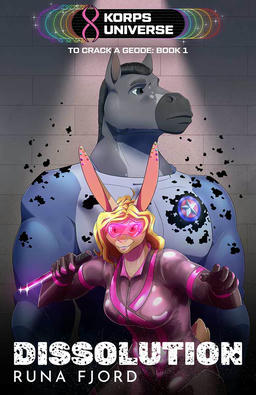A terrific, action-filled introduction to two new characters—and the start of a new series—in the joyously queer Korps Universe.
Review: Dissolution
Arilin Thorferra

Dissolution
To Crack a Geode: Book 1
Runa Fjord
FurPlanet Productions
November 2024
Print Edition $19.95
Ebook Edition $9.95 (DRM-free)
Earlier this year I reviewed Induction, the first Korps Universe novel released by FurPlanet; with five books out now, each one the opening volume of six planned series, the story universe is becoming as ambitious as the queer villains-with-an-asterisk that it chronicles.
Dissolution begins with a scene that overlaps with the “Surface Rupture” graphic novel, with neophyte villain Starshade in the middle of robbing a bank vault. The rabbit isn’t as interested in the haul as she is in simply screwing things up for the bank’s richest clientele. In short order members of the Texas Protectorate Assembly, the state-run superhero team, show up to stop her—but unexpectedly, her link to ROSE, the Korps’s AI assistant, breaks, leaving her unable to call for backup. It quickly becomes clear the TPA is throwing everything they have at her. Even as resourceful as Starshade proves to be, the relentless pursuit wears her down. Injured and exhausted, she’s cornered by Slate, a massive Percheron who is, by all accounts, the perfect law-abiding, white hat TPA ranger. So why, then, does the hero not take her in, instead acquiescing to her protest that doing so would be a death sentence for her and letting her escape?
Unbeknownst to the rabbit, Slate’s confrontation with her is the straw that broke the horse’s back. While the hero has long believed in the professed mission of the TPA, he’s had to excuse or write off a lot of corruption and cruelty over the years, and he realizes that Starshade’s fear of the ostensible good guys is legitimate. Returning to base, Slate looks in the mirror—literally—and realizes he doesn’t at all like what he sees. When the TPA has a second chance at capturing Starshade, Slate has to decide which side to be on, and that’s a choice there will be no going back from.
Let me get Crazy Literature Professor on you for a moment: there’s a theory of story called “Dramatica” that shares its name with a now-defunct piece of software. Dramatica is, frankly, wildly overthought, but it has a few ideas that stuck with me for years, and the best one is this: a great way to structure a story is with a plot arc of protagonist versus antagonist, and a thematic arc of main character versus catalyst character. The catalyst may be helping or hindering the protagonist in the main plot (they might be the actual antagonist, in fact), but their real role is to force the main character to face the crucial issue the story’s theme revolves around.
I’ve rarely seen books, in or out of furry, that so clearly illustrate that protagonist/antagonist, main/catalyst dichotomy than the two Korps novels I’ve read so far, and that’s very much because of the focus on queer and trans identity. In Induction, Volta is both main character and protagonist—which is usually, but not always, the case—with Carmen the catalyst. In Dissolution, though, Starshade has already embraced her inner villain—while she’s (arguably) the story’s protagonist, she’s not the one with the thematic journey ahead. She’s the catalyst character to Slate, the one who, as the horse laments to her in a terrific, anguished monologue, stole his blinders. As for the antagonists—well, getting into that beyond “the TPA” could get spoilery, but suffice it to say that there’s a personal angle to the conflict.
Okay, let’s back out of the weeds now. There’s certainly introspection and wrenching emotion in Dissolution, but there’s a lot of well-crafted action in it, with plot twists, tense family dynamics, and shifting alliances. Slate’s journey isn’t unpredictable, but it’s well-executed, and we learn more intriguing bits about the Korps here and there. Runa Fjord has a good ear for dialogue, and a knack for small funny asides that add to the characterization. (Starshade’s penchant for distracting herself by noticing how hot someone she’s talking, or even fighting, with looks comes up more than once.) There are typographic flourishes when Starshade uses her superpower, and while I’m on record as being skeptical of such, these mostly won me over. The novel ends on a cliffhanger, but it’s still a satisfying and thrilling read. You’ll want to catch up with Starshade and Slate again as soon as possible—and might be tempted to pick up more Korps novels while you wait.